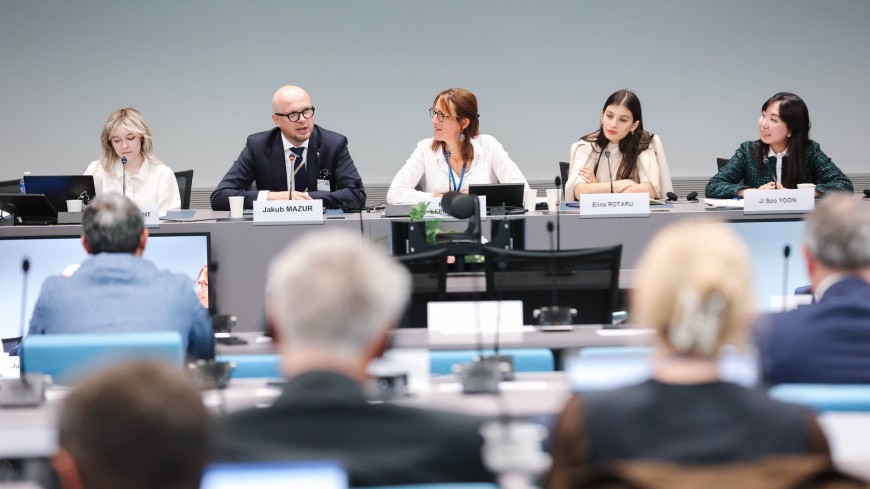The round table on “Local innovation for stronger local authorities” held on 13 September during the Congress Conference showed that social and technological innovation is as much about incorporating human rights into local policies as it is about how we approach climate change, the fight against cyberbullying or the use of AI to make the process of integrating Ukrainian refugees in host countries more effective. Sharing good practice in these areas remains a priority for the Congress and associations of local and regional elected representatives.
Deputy Permanent Rapporteur on human rights Mélanie Lepoultier opened the discussion by talking about the priority given by the Congress to mainstreaming the notion of human rights in local and regional policies. And the ensuing decision to appoint a permanent rapporteur and two deputies, who had carried out a series of study visits within the Council of Europe and the European Court of Human Rights to produce a list of possible actions and synergies to be developed. At present, local and regional elected representatives were recognised as full-fledged bearers of shared human rights obligations, but there was still a great deal of work to be done to raise awareness. This particularly applied to the perception of the notion, which was not a legal concept but a tangible, everyday reality requiring concrete acts of governance on the part of local elected representatives. In order to map the degree of integration of human rights in local and regional government throughout Europe, the Congress was therefore preparing a report that would enable it to refine its strategy in this area. Sharing the information contained in Congress human rights handbooks with examples of good practice could provide a source of inspiration here. This was an area in which innovation, including technological innovation, could offer unexpected solutions to challenges such as hate speech, polarisation, violence against girls and women, persistent discrimination against LGBTI people, people with disabilities, etc.
Talking about the use of AI and digital tools to receive, and manage the integration of, Ukrainian refugees in Wroclaw (Poland), the Deputy Mayor of Wroclaw Jakub Mazur warned his colleagues that the human factor and the individual approach must always come first. AI, however, had the potential to help his administration in the 3 key phases of the refugee reception process, which had seen the city’s population swell by 300 000 inhabitants in just two years. Firstly, to find host families via a digital contact platform, then to find jobs that were compatible with the skill levels of the new arrivals, and lastly to identify the most suitable areas of the city to build housing without placing undue strain on the urban infrastructure.
Today, however, building housing required close attention to be paid to the challenges associated with climate change. Ji Soo Yoon, a policy analyst at the OECD specialising in sustainable buildings, pointed out that the sector was responsible for almost 37% of the world's energy-related greenhouse gas emissions. Yet buildings were primarily local infrastructure, whose quality varied from city to city and region to region. Decarbonisation strategies should therefore be tailored to the specific needs of existing infrastructure and the needs of citizens, which was why the role of local government was so important. She recommended three approaches: an assessment of existing buildings by each municipality; the implementation of a green policy that moved forward incrementally, without upsetting local residents; and, last but not least, vertical and horizontal co-ordination between local, regional and national governments to ensure that changes were consistent with overall energy and housing policies. Concluding that national associations of municipalities had a crucial role to play in this context, Ji Soo Yoon gave the example of the step-by-step co-ordination of the Dutch “Natural Gas- Free Neighbourhoods” (PAW) programme where local authorities were moving forward one district at a time.
Lastly, Alicia Ann Blount, Congress Youth Delegate for the United Kingdom, spoke about the role of local and regional authorities in combating cyberbullying. After talking at length about the meteoric technological and social evolution of Internet practices, she highlighted the inability of national jurisdictions to provide appropriate and timely responses. Hence the need for innovative approaches involving local and regional authorities. Firstly, they could launch educational programmes for young people, immigrants and other groups to instil responsible behaviour and respect for sexual or cultural differences. Secondly, a legal approach could involve co-operation between local authorities and the police with anonymous reporting systems on cyberbullying such as ChildLine or e-Enfance, but also in order to create awareness and re-education programmes. Lastly, setting up secure online gaming platforms for children could be an appropriate solution for the youngest members of society.
Moderated by Elina Rotaru, Congress Youth Delegate for Romania, the floor debate also raised the issue of the use of AI by local authorities to deal with an ageing population by installing security alarms and night-time surveillance cameras in the homes of the elderly. These technologies could also be used to put in place mechanisms for the rapid evacuation of the population in the event of war or natural disaster, or to help increase citizen participation in local policies, particularly in relation to climate change. AI-assisted platforms could also facilitate the return of refugees to Ukraine after the war, as well as making the exchange of best practice between local elected representatives more effective, including in the context of aid to Ukraine.
In conclusion, special thanks were extended to the Congress for including its youth delegates as moderators and very active participants in the Conference debates.




